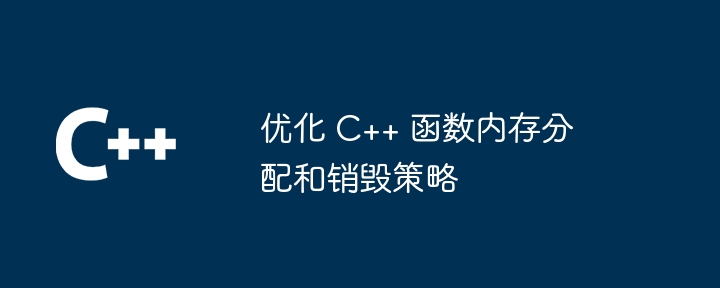
In order to optimize memory management in C functions, the following strategies can be adopted: pre-allocate memory, shared memory and use object pools to avoid frequent allocation and release of memory. Use smart pointers to automatically release memory and eliminate the risk of memory leaks. Use RAII mode to ensure resources are released when an object goes out of scope. Use move semantics to avoid unnecessary memory allocation and deallocation. Optimize deallocation order to ensure that deallocation of reference objects takes precedence over deallocation of parent objects.

Optimize C function memory allocation and destruction strategy
Memory management is an important aspect of C programming, optimize memory allocation and destruction strategy Can significantly improve application performance. This article explores various techniques to help you optimize memory management in C functions.
1. Avoid frequent allocation/deallocation
Frequent allocation and deallocation of memory can cause memory fragmentation and reduce performance. To avoid this, prioritize the following strategies:
2. Use smart pointers
Smart pointers (such as std::unique_ptr and std::shared_ptr) automatically manage memory and automatically manage memory when the pointer goes out of scope. Automatically release the memory. This eliminates the risk of leaks that occur if you forget to free memory.
3. Adopt RAII (resource acquisition is initialization)
RAII is a programming pattern that ensures that resources (such as memory) are released when the object goes out of scope. This can be achieved by acquiring resources using the constructor and releasing them in the destructor.
4. Use move semantics
Move semantics allow ownership to be transferred from one object to another without copying. By using moves instead of copies, unnecessary memory allocations and deallocations can be avoided.
5. Optimize the order of deallocation
In some cases, the order of deallocation of objects is important. Make sure to deallocate the referenced objects first, and then deallocate the parent objects that reference them. This will prevent dangling pointers and undefined behavior.
Practical Case
Consider the following code example, which shows how to optimize the memory allocation and destruction strategy:
#include <vector>
#include <memory>
std::vector<int> get_fibonacci_sequence(int n) {
// 使用预分配的 vector 避免频繁分配
std::vector<int> sequence(n);
// 使用移动语义避免不必要的复制
for (int i = 2; i < n; i++) {
sequence[i] = std::move(sequence[i - 1] + sequence[i - 2]);
}
// 使用 RAII 自动释放内存
return sequence;
}This example pre-allocates a vector to avoid frequent allocations and use move semantics to avoid unnecessary copies. It also implements RAII by implicitly calling std::vector's destructor when the function returns.
The above is the detailed content of Optimize C++ function memory allocation and destruction strategy. For more information, please follow other related articles on the PHP Chinese website!
 What are the differences between c++ and c language
What are the differences between c++ and c language
 Recommended learning order for c++ and python
Recommended learning order for c++ and python
 Cost-effectiveness analysis of learning python and c++
Cost-effectiveness analysis of learning python and c++
 Is c language the same as c++?
Is c language the same as c++?
 Which is better to learn first, c language or c++?
Which is better to learn first, c language or c++?
 The difference and connection between c language and c++
The difference and connection between c language and c++
 C++ software Chinese change tutorial
C++ software Chinese change tutorial
 Cost-effectiveness analysis of learning python, java and c++
Cost-effectiveness analysis of learning python, java and c++




